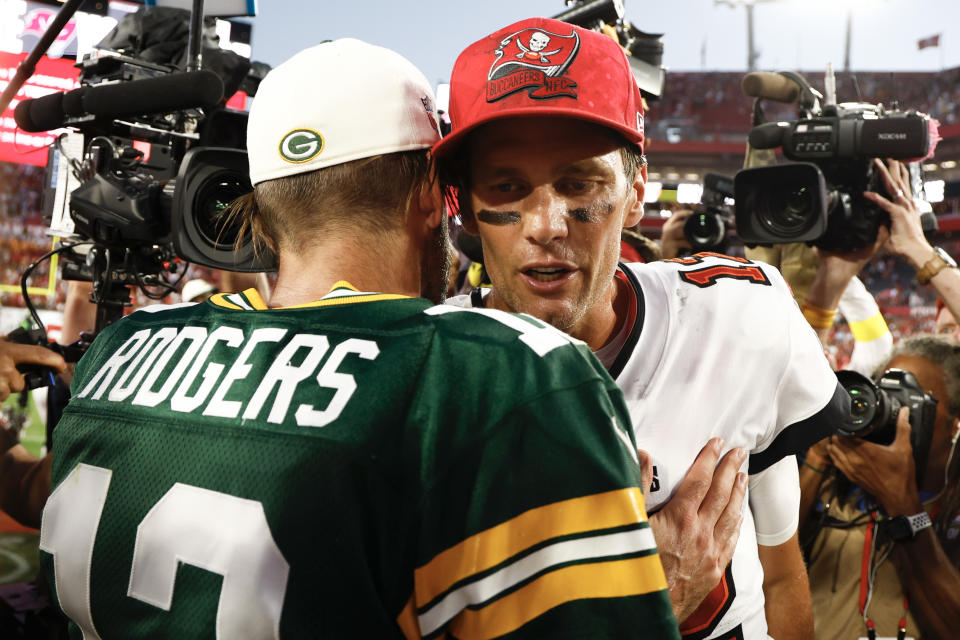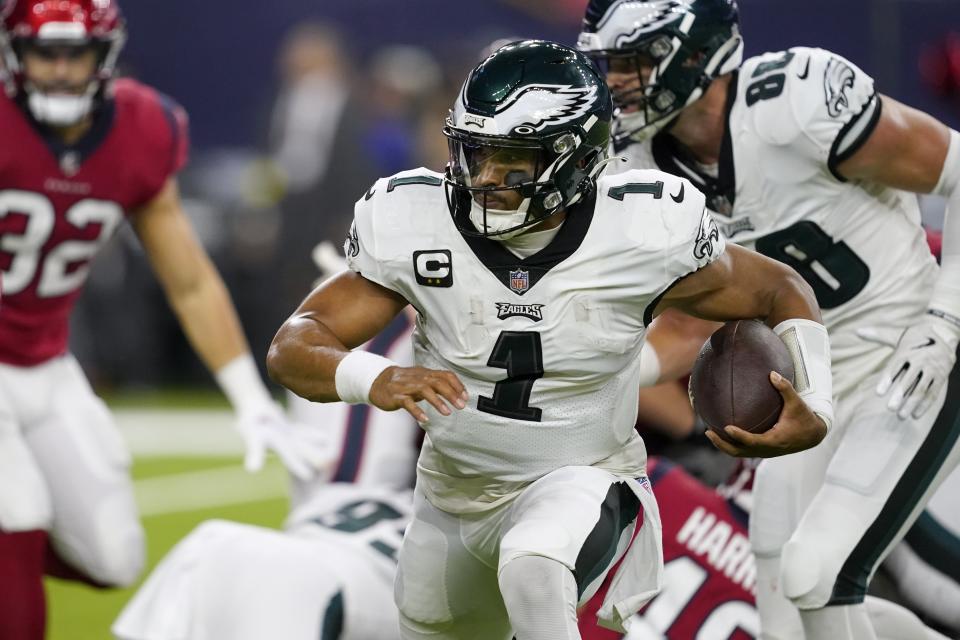If quarterbacks are the NFL’s main characters, then this season has been playing out like one long Ozymandias episode for a spoiled generation. Tom Brady and Aaron Rodgers — along with more moderately aged stars Russell Wilson and Matthew Stafford — have suddenly been humbled by the game they dominated for so long. After years of outrunning the odds, age and offseason tumult, this simultaneous hitting of the skids has felt disorienting.
In trying to grasp the implications, it has been tempting to look for one interconnected explanation, for a cause. That’s been difficult to do as the narrative around Brady and Rodgers produces almost weekly ripple effects that bring their own complicating questions to the table: Scoring is down! Surprising teams have leapt into the Super Bowl conversations! The prototype of a great quarterback has been forever altered!
We’ve gotten used to talking and thinking about star quarterbacks as proxies for their teams, for their entire franchise’s fortunes. But read anything about the NFL’s most prominent underwhelming seasons, especially those of the Green Bay Packers (4-6) or Tampa Bay Buccaneers (5-5), and you’ll see a necessary acknowledgement of reality, a caveat that these are not actually one-man shows.
“Dragged down by weaker supporting casts,” the Wall Street Journal mentioned before centering on the stumbling heroes: “Brady and Rodgers have fallen short of the lofty standards they set for so long. And in turn, they’re dragging down the league-wide scoring average.”


After a dismal loss to the Washington Commanders in late October, Packers head coach Matt LaFleur put it more pointedly when asked if Rodgers needed to play better for the team to pull out of its tailspin.
“I think it takes everybody. It takes everybody around him,” LaFleur said. “You’ve got to have the protection in front of you to be able to hold up. You’ve got to have the guys making plays, too.”
That may sound like a deflection, like coach speak. But the harder you examine the struggles and recent glimmers of hope, the more it rings true.
For all the ways in which the prodigiously weird personalities of Brady, Rodgers and Wilson are extremely deserving lightning rods, this season’s disappearing act might prove that they get too much of everything flung their way over the whole quarterbacking thing. The NFL’s best teams are consciously building around mortal signal-callers, not expecting a savior.
What the numbers say about Tom Brady, Aaron Rodgers
Let there be no doubt that Brady and Rodgers are not playing as well as we have come to expect from them. Over the past two full seasons, they have been patrolling the top of most major statistical leaderboards alongside Kansas City Chiefs QB Patrick Mahomes. In advanced metrics that drill down to the play-by-play level, Rodgers and Brady ranked as the top two QBs in 2021-22 by Football Outsiders’ DVOA. This season, they’re eighth (Brady) and 14th (Rodgers).
It’s a similar story in Adjusted EPA/play, a stat that gauges how successful they are based on the outcomes of each snap vs. that snap’s average outcome across the league. They ranked No. 1 and No. 3 among regular quarterbacks for the past two completed seasons combined. This year, they are languishing in 15th and 19th, between the likes of Detroit’s Jared Goff and Jacksonville’s Trevor Lawrence.
Under the hood, Brady’s need to get the ball out quickly has dramatically reduced the average air yards of his throws, meaning he isn’t throwing nearly as many deep balls or even taking as many field-stretching intermediate shots. Rodgers’ greatest decline comes in completion percentage over expected — essentially a measure of how many more difficult throws he completes than your average passer. Whether it’s receiver quality, lack of a clean pocket or both, Rodgers is actually below the league average in that category this season after pacing the world in it the past two years.
That overwhelming recent success is clouding our perceptions. The dramatic duo of Brady and Rogers looked similarly middling back in 2019 — Brady’s last season in New England, and Rodgers’ first playing under LaFleur — finishing 13th and 17th among qualified passers in DVOA.
Rodgers, in particular, was viewed as dangerous but perhaps no longer domineering. Many of his numbers — helpfully adjusted for era by Pro-Football-Reference — dipped below the league average as the Green Bay brain trust built around a running game and a defense that didn’t necessarily need quarterback excellence to win games. Back-to-back MVP campaigns later, Rodgers’ career arc now includes new heights achieved in tandem with wide receiver Davante Adams in elite form.
So maybe the return to earth isn’t cause for existential alarm when you consider the fact that Rodgers doesn’t have Adams anymore — or any other proven wide receiver — and has often been missing Pro Bowl left tackle David Bakhtiari for huge swaths of games due to nagging injuries. Brady, meanwhile, has been trying to operate without his top-line targets playing together until the past two weeks, and compensating for a dreadful rushing attack that has ranked among the league’s least effective.
You can find similar excuses for Matthew Stafford’s depleted Los Angeles Rams offense, and for Wilson’s dreadfully coached new unit in Denver.
Left tackle injuries. Depleted receiving rooms. Disadvantages played up by defensive tactics.
These are all very valid theories for the overall scoring dip across the NFL that actually apply almost as neatly to slumping veteran quarterbacks. Yahoo Sports’ Jori Epstein reported last month that defenses have ramped up their usage of zone schemes that hinder the deep passing game. Football Outsiders made a similarly persuasive case that the scoring problem is, more specifically, a passing problem.
More and more evidence, anecdotal and otherwise, points to a defensive counterpunch that is corralling the high-flying offenses led by Rodgers, Brady and others while giving up some ground to, well, the ground attack.
Is the run game making a comeback?
Here’s passing and rushing efficiency on early downs.
Could be A Thing (especially on 2nd down?), could be noise. pic.twitter.com/ljUsjJM3v9
— Computer Cowboy (@benbbaldwin) November 16, 2022
As both the Buccaneers and Packers showed signs of life in Week 10 wins, they managed to finally shift some responsibility off the shoulders of their quarterbacks. The Bucs had their best rushing game (by a mile) since Week 1 as they got top receivers back in a groove, and the Packers beat the Dallas Cowboys by putting more emphasis on the run and making hay via the play-action.
How ‘limited’ quarterbacks can lead to unleashed offenses
If those adjustments feel like suboptimal, temporary moves to save sinking ships, maybe they are, sure. But just checking the ages of the league’s biggest quarterback names would tell you that some evolution of the QB Savior Landscape was in store. After watching the new school duel between Mahomes and Buffalo’s Josh Allen in last season’s playoffs, The Ringer’s Steven Ruiz proclaimed that “good enough is no longer good enough,” meaning ultra-athletic stars who can move and throw darts are the future.
The problem with that is obvious. There just aren’t many of them. Brady and Rodgers certainly aren’t in that mold. Maybe the maxim most teams should be learning is a different line from that story: “If an NFL team is going to hitch its wagon to a quarterback with limited physical ability, it better put a loaded group around him.”
A couple of the NFL’s best teams in 2022 did that, and they are providing pretty irrefutable support for the practice of confronting a quarterback’s limitations and scheming to either disguise them or turn them against the defense. No one would claim Miami Dolphins quarterback Tua Tagovailoa or Philadelphia Eagles QB Jalen Hurts are more gifted than Brady or Rodgers, and I doubt many would bet on them outproducing the elder statesmen in 2023-24, but the offenses designed around their less acclaimed skills have been world-beaters.


The Eagles have brought back that oft-misunderstood buzzword tactic — the RPO (run-pass option) — at a perfect time. Hurts’ wheels allow Philadelphia to torment defenses that spend just about every other week of the season doubling down on stopping deep passes.
“They are using the tactic precisely the way it is supposed to be used,” Football Outsiders explained, “not as a cheesy completion-rate booster but a way of making sure any choice the defense makes is wrong.”
Meanwhile, in Miami, new Dolphins head coach Mike McDaniel has Tagovailoa — the same QB who struggled to fit passes into tight windows the past few seasons — leading the game’s most prolific air attack thanks to a barrage of smart play designs that weaponize the extreme speed threat from receivers Tyreek Hill and Jaylen Waddle.
With a 14-team playoff field, the Packers and Bucs may well have enough cushion to find their own version of these fixes. So yes, rebounds for Rodgers and Brady, even Super Bowl runs, are very much on the table. That table, though, can’t be set without a lot of other things going right. The great quarterback downturn of 2022 might just be a timely reminder.
